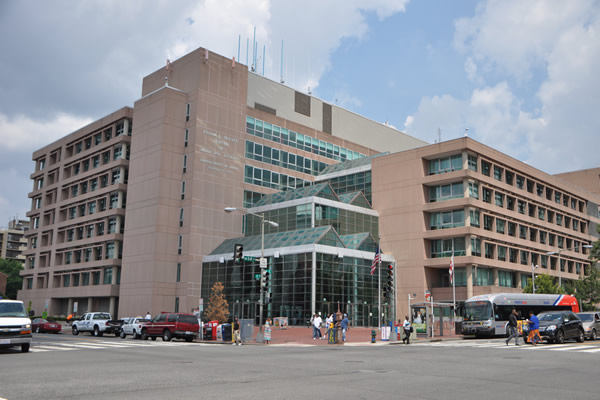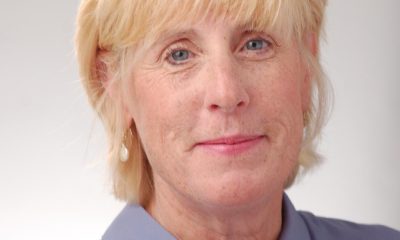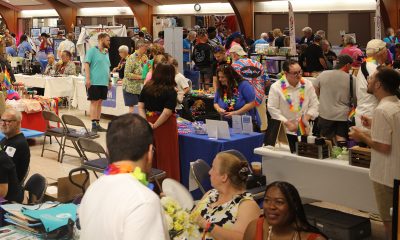Arts & Entertainment
Stadium deal prompts D.C. Center to reconsider move
Mayor promises ‘suitable’ relocation after Reeves building closes
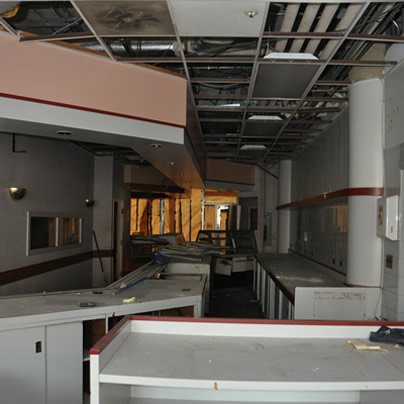
The D.C. Center for the LGBT Community announced late Friday that it has put on hold the renovation of the space into which it planned to move in September in the city’s Reeves Center municipal building following news one day earlier that the building will likely be demolished in three years.
Mayor Vincent Gray and at least three of his top aides said the city would help the D.C. Center find a new location if and when the Reeves building closes.
Gray’s comments came during a news conference on Thursday in which Gray announced that the Reeves building at 14th and U streets, N.W. would be given to a private developer in exchange for land to build a new soccer stadium in the Buzzard Point section of Southwest D.C.
“We are going to make sure they are relocated to a suitable place,” Gray said in response to a question from the Blade.
Gray announced that the land swap was part of a proposed $300 million deal involving the city and D.C. United, the major league soccer team that has long sought to move out of the city’s aging and outdated RFK Stadium.
“Since signing our lease in January of this year, the D.C. Center has expended thousands of volunteer hours and thousands of dollars in renovating the space in the Reeves Center with anticipation of a September move-in date,” Center Board President Michael Sessa said in a July 26 statement.
“Unfortunately, continued renovation of the Reeves Center space will stop effective immediately until we have a better understanding of where the mayor proposes to relocate the D.C. Center,” Sessa said.
The soccer stadium deal and land swap must be approved by City Council. And two other private owners of land needed for the new stadium, including PEPCO, have yet to consent to sell their respective properties.
But Gray and five members of Council who support the deal predicted the remaining obstacles would be overcome because the multi-million dollar project would be of great economic benefit to the city.
Matthew Klein, president of the Akridge development company, which would acquire the Reeves building in the land swap, unveiled an architectural drawing at the news conference of a new building that would be constructed at the site of the Reeves building. The new building is expected to include residential and commercial space.
D.C. Center Executive Director David Mariner noted on Thursday following the mayor’s news conference that the Center’s 15-year lease at the Reeves building requires the Center to spend at least $70,000 to renovate the first-floor, storefront space to get it ready for occupancy.
Mariner said the demolition part of the renovation has been completed through the help of volunteers from the community. With the sudden news that the Center’s stay in the building is likely to be two or three years rather than 15 years or more, Mariner said the Center’s board must decide whether it still makes sense to move into the Reeves building.
“I don’t think we are prepared to invest the time, energy and labor on a massive renovation project if you can’t guarantee that we’ll be there for more than two years,” Mariner told Brian Hanlon, director of the D.C. Department of General Services (DGS) in a conversation following the news conference.
“You mentioned time and money and investment and I think there are ways to incorporate all those things into where we’re going,” Hanlon told Mariner.
Hanlon said one possible way to address the expenses noted by Mariner is for the city to offset them in a new rental agreement at another nearby city-owned building or city-operated building.
Tony Robinson, a spokesperson for the Office of the City Administrator, told the Blade that Gray and other city officials were looking into new rental space for the center at a private building in which a number of city agencies are located at 1250 U St., N.W. The building is two blocks from the Reeves building and one block from the D.C. Center’s current space at 1318 U St., N.W.
The Center had to look for a new location after an unrelated development project required that it vacate its current U Street space.
“What I’m saying is the DGS, the mayor, the government is committed to making sure you all find a home in Ward 1,” Hanlon told Mariner. “It’s my understanding that that’s the epicenter of the community that you serve. So we’re committed to working that through.”
Sessa told the Blade earlier in the day on Friday that Center officials will be meeting next week with Gray’s chief of staff Christopher Murphy and possibly others from the mayor’s office to discuss the Center’s options.
“Of course that’s under review,” said Sessa when asked if the Center was considering dropping plans to move into the Reeves building. “Everything is under review. But what action we take has to be based on our discussion with the city, which hasn’t happened yet.”
In the Center’s statement released later in the day on Friday Sessa said, “We have requested a meeting [with city officials] immediately as we are scheduled to vacate our current space within less than 60 days. We look forward to hearing the mayor’s plans and working with the city to ensure a permanent home for the LGBTQ community.”
Fate of gay nightclub unclear
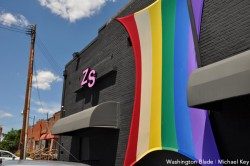
Ziegfeld’s/Secrets (Washington Blade file photo by Michael Key)
Robinson of the City Administrator’s office told the Blade the soccer stadium proposal calls for building a hotel and other businesses such as restaurants and shops near the site of the new stadium.
The gay nightclub Ziegfeld’s/Secrets is located in that area at 1824 Half St., S.W., which is outside the footprint of the soccer stadium but within the area for the ancillary development.
Robinson said the property owners of buildings and land outside the stadium footprint are free to decline to sell to developers and remain in the area as long as they wish.
“There are no plans to do eminent domain for anything except what’s in the footprint of the site [of the stadium],” he said. “There are no plans to close any other facility.”
However, Ziegfeld’s/Secrets currently rents its space in a building owned by Denver businessman Marty Chernoff, who owned and operated the former gay nightclub Tracks in a warehouse building that has since been demolished to make way for an office building.
Chernoff told the Blade that he has known Ziegfeld’s/Secrets principal owner Allen Carroll for a long time and will give Carroll the first right to buy the building if and when Chernoff decides to sell it. He said at least one real estate broker representing a developer has approached him to buy the building.
“I want to make it completely clear that I am not the one forcing him out,” Chernoff said. “So if he chooses to do something because of whatever economic pressure there is or something like that, that would be his choice.”
Carroll couldn’t immediately be reached for comment.
Gay and Lesbian Activists Alliance President Rick Rosendall said LGBT community advocates called on the city to help Ziegfeld’s/Secrets find another suitable location when it was displaced in 2006 by construction of the Washington Nationals Baseball Stadium.
The baseball stadium development forced Ziegfeld’s/Secrets, which features drag shows and male nude dancers, and four other gay clubs to move from the unit block of O Street, S.E., where they had been located for close to 30 years.
Rosendall said GLAA would urge the city to assist Ziegfeld’s/Secrets to find a suitable new home if the club is displaced yet again by development triggered by the proposed soccer stadium.
Photos
PHOTOS: Sydney Gay and Lesbian Mardi Gras Parade
48th annual LGBTQ event held in Australian city

The 48th annual Sydney Gay and Lesbian Mardi Gras Parade was held on Feb. 28.
(Photos by Cori Mitchell)




















a&e features
35 years after ‘Truth or Dare,’ Slam is still dancing
Salim Gauwloos on Madonna, HIV, and why he almost didn’t audition for Blond Ambition Tour

Most gay men of a certain age remember “the kiss.”
It was the moment Madonna’s dancers Salim Gauwloos and Gabriel Trupin locked lips in the hit 1991 documentary film “Truth or Dare,” which is celebrating its 35th anniversary this spring.
The kiss was hot, but what made it groundbreaking is that it appeared in a mainstream Hollywood movie that screened in suburban multiplexes across the country. This wasn’t an obscure art house film. The movie, and tour on which it was based, received months of breathless media attention all over the world for bold expressions of female empowerment and queer visibility. Madonna was threatened with arrest in Toronto for simulating masturbation on stage and Pope John Paul II urged Catholics to boycott the show, triggering a media firestorm.
“Truth or Dare” was billed as a behind-the-scenes documentary of the tour, but it quickly became clear that the real star of the show wasn’t Madonna, but rather her colorful troupe of seven backup dancers, six of whom identified as gay: Kevin Stea, Carlton Wilborn, Luis Xtravaganza Camacho, Jose Gutierez Xtravaganza, Gauwloos, and Trupin; Oliver Crumes III identifies as straight.
We saw them party and march in the New York City Pride parade. They were unabashedly queer at a dangerous time — before protease inhibitors began to stem the AIDS plague and before most celebrities and politicians embraced the gay community in any real way. Being out in 1991 carried major risks to career and reputation.
Enter Gauwloos, one of those brave dancers who vogued his way into the hearts of countless gay men entranced by his handsome looks, his stage presence, and dance skills.
Gauwloos — known then and now as “Slam”— sat down with the Blade to talk Madonna, the lasting impact of “Truth or Dare,” the public disclosure of his HIV status, and plans for a new book on his life.
His story is fascinating — from growing up in Europe to dancing in New York to landing the gig of a lifetime with Madonna. He performed on that tour while secretly HIV positive and went without medical treatment for 10 years because he was living in the United States as an undocumented immigrant. Not even Madonna knew of his HIV status. Two other dancers on the tour were also HIV positive but no one talked about it. Ironically, Madonna was singing “Express Yourself” and advocating for condom use during her concerts yet backstage three of her dancers were secretly positive.
“A lot of people were dying so I wasn’t going to tell Madonna I had HIV,” said Slam, now 57. “And the others didn’t either. It wasn’t the moment to do it. She used to make speeches about Keith Haring and AIDS and I thought it’s going to be me next.”
Gabriel Trupin died of AIDS in 1995. Slam was diagnosed at age 18 in 1987, a frightening time when a positive test result often meant a death sentence. He booked the “Blond Ambition Tour” at age 21 after moving to New York. His friends encouraged him to audition but Slam resisted because he wasn’t a big Madonna fan.
“It was crazy, everyone wanted that job,” he said, “but I wanted to dance with Janet Jackson and Paula Abdul.” He listened to his friends and shortly after the audition, Slam received a call from Madonna herself inviting him to join the tour.
“We all wanted to be stars but not even Madonna knew how big that tour would become. The way it was choreographed and directed, the stars aligned. … It never looks dated even today.”

The world tour kicked off in Japan in April 1990 then moved to the United States and Europe, stirring controversy wherever it went. There was the iconic cone bra; the aforementioned simulated masturbation during “Like a Virgin”; and religious imagery that offended many Catholic groups and the Vatican.
And the controversy didn’t end with the tour. Cameras were rolling throughout the tour for what Slam thought would be a “video memory” for Madonna. But as the tour unfolded, director Alek Keshishian reportedly became more interested in what was happening behind the scenes so plans for mere tour footage were expanded into a full documentary.
“We were young and partying and didn’t really know what was going on,” Slam said. “You live in this celebrity bubble and you sign a paper – I don’t even know what I signed.”
In 1992, Kevin, Oliver, and Gabriel sued Madonna for invasion of privacy and fraud claiming she used some footage without their consent. They claim they were told nothing would be included in the film that they didn’t want to be seen. In one specific incident, Gabriel alleged that he told producers he didn’t want the scene of him kissing Slam to be in the film as he wasn’t fully out.
“Gabriel was forcibly outed,” in the movie, Kevin said in a 2016 interview.
Slam did not join his colleagues in the lawsuit.
“I couldn’t sue because I was illegal but I wasn’t ever going to sue,” Slam said. “I’m not a suing kind of person. But good for them, they fought for it and won. A lot of people don’t have the balls to sue Madonna.” The suit was settled two years later for an undisclosed sum.
“We were all conflicted about the kiss,” he said with a laugh. “The kiss, oh my God, my boyfriend is going to kill me! Belgian stress!”
Beyond worrying about his boyfriend’s reaction, Slam had concerns about the impact of being openly gay on his modeling career.
“In 1990, you couldn’t get high fashion campaigns as an openly gay model,” he said. “I was worried about that. I couldn’t get a campaign because I was gay. My agency told me to say I was straight and it was just a game.”
In 2016, pegged to the 25th anniversary of “Truth or Dare,” the surviving six dancers filmed a documentary about their lives post-Madonna titled “Strike A Pose.” In it, Slam publicly revealed his HIV status for the first time in an emotional scene with his former colleagues.
“I found the strength to tell the world I have HIV,” he recalls. “I was scared but I felt brave. The outcome and messages were beautiful. After I saw ‘Strike A Pose,’ I knew we gave people hope. And not just for gay people.”
He was infected in 1987 but didn’t get treated until 1997. After the tour ended, he said he went into a depression and his agency dropped him.
“I was partying too much after the tour,” he recalls. “I made a decision to live as an illegal alien.” In 1997, Slam collapsed and was rushed to the hospital with pneumonia.
“They started treating me and thank God the new HIV drugs were out, the cocktails, it took me a couple months to get better.”
Madonna didn’t participate in “Strike A Pose” and Slam said he hasn’t seen or spoken to her since the end of the tour. He said he had no idea of the impact “Truth or Dare” would have.
“You look at this movie in 1991 and you don’t think it’s going to be such a big thing and 35 years later it’s still helping people,” he said. “It was helpful for people who felt alone at that time. It was such an important documentary.
“I don’t think younger gay people realize how important Madonna was to gay and queer visibility — she was a big part of it. We showed the world it’s OK to be gay and that was the great message of this movie.”
He noted that, decades later, many of his friends have transgender kids and that queer culture is represented in much of mainstream pop culture.
“It’s amazing how far we’ve come,” he said. “I know we’ll always be marginalized but we have come so far. I’m really proud of our community. The current nightmare will be over and I do believe that things will get better.”
Referencing President Trump’s attacks on the LGBTQ community and crackdown on immigration, Slam described the situation in the U.S. today as “sad.”
“Everything is such a mess,” he said. “Some of these people have lived here 30-40 years and they take you out of your home. I can’t even imagine. It breaks my heart. When I was illegal it was a different story.”
Slam met his husband, Facundo Gabba, who’s from Argentina, in 2000, and he helped him get a legal case together to win citizenship. He filed a case in 2001 and was told there was a 99 percent chance he wouldn’t be permitted to stay in the United States because they weren’t allowing HIV-positive immigrants to remain in the country. But he got his green card anyway in 2005 and became a U.S. citizen in 2012.
Today, Slam and Gabba live in Brooklyn, though they travel a lot because “I can’t take the cold.” The couple married in Argentina in 2010 and in the U.S. in 2016.
Slam is still dancing and working as a choreographer. He’s teaching at a contemporary dance festival in Vienna in July and even offers online lessons via Salimdans.com.
As a longtime HIV survivor, Slam is dedicated to a healthful lifestyle.
“You have to keep moving; when you move you stay healthy,” he says. “Dance heals everything. I do yoga, I eat healthy and clean as possible. I don’t watch much TV … I try to stay healthy and positive. If I absorb all of the negativity I would be sick.”

In addition to his ongoing work in dance and choreography, Slam is in the early stages of writing a book about his extraordinary life and pioneering career.
“I always knew I had a book inside of me. I want to talk about my HIV status. I know I can inspire more people. I want to tell even more secrets in the book; secrets are a poison so I want to tell everything.”
Among those secrets, he notes, is a desire to write about his strict Muslim father and the years he spent as an undocumented immigrant in America.
“Those are the things I want to talk about, the struggles. It’s a love story, hope and resilience. I know it will help people.”
As for his friends from the tour, Slam says he remains in contact with Gabriel’s mother and José Xtravaganza is his best friend. Baltimore’s Center Stage theater is currently developing a new musical about Xtravaganza’s life. And Slam said he occasionally talks to Oliver, though “he still can’t pronounce Sandra Bernhard’s name.”
At the end of our interview, Slam indulged a round a rapid fire questions:
• Favorite song to perform in the “Blond Ambition” tour? “Express Yourself.”
• Aside from Madonna, who was your favorite artist you worked with? Toni Braxton in “Aida” on Broadway.
• Favorite Madonna song? “Live to Tell”
• Favorite Madonna video? “Bedtime Stories”
• What’s more stressful: performing in a concert or performing on the VMAs? “Both, because we always had to be perfect.”
• Did you go to Madonna’s recent “Celebration” tour? “I didn’t see the show but I saw clips online.”
• What do you remember most about performing “Vogue” at the VMAs? “It was nerve-racking for them to flip those fans.”
• When was the last time you vogued? “I teach classes so a couple weeks ago.”
Books
Love or fear flying you’ll devour ‘Why Fly’
New book chronicles a lifetime obsession with aircraft

‘Why Fly’
By Caroline Paul
c. 2026, Bloomsbury
$27.99/256 pages
Tray table folded up.
Check. Your seat is in the upright position, the airflow above your head is just the way you like it, and you’re ready to go. The flight crew is making final preparations. The lights are off and the plane is backing up. All you need now is “Why Fly” by Caroline Paul, and buckle up.

When she was very young, Paul was “obsessed” with tales of adventure, devouring accounts written by men of their derring-do. The only female adventure-seeker she knew about then was Amelia Earhart; later, she learned of other adventuresome women, including aviatrix Bessie Coleman, and Paul was transfixed.
Time passed; Paul grew up to create a life of adventure all her own.
Then, the year her marriage started to fracture, she switched her obsession from general exploits to flight.
Specifically, Paul loves experimental aircraft, some of which, like her “trike,” can be made from a kit at home. Others, like Woodstock, her beloved yellow gyrocopter, are major purchases that operate under different FAA rules. All flying has rules, she says, even if it seems like it should be as freewheeling as the birds it mimics.
She loves the pre-flight checklist, which is pure anticipation as well as a series of safety measures; if only a relationship had the same ritual. Paul loves her hangar, as a place of comfort and for flight in all senses of the word. She enjoys thinking about historic tales of flying, going back before the Wright Brothers, and including a man who went aloft on a lawn chair via helium-filled weather balloons.
The mere idea that she can fly any time is like a gift to Paul.
She knows a lot of people are terrified of flying, but it’s near totally safe: generally, there’s a one in almost 14 million chance of perishing in a commercial airline disaster – although, to Paul’s embarrassment and her dismay, it’s possible that both the smallest planes and the grandest loves might crash.
If you’re a fan of flying, you know what to do here. If you fear it, pry your fingernails off the armrests, take a deep breath, and head to the shelves. “Why Fly” might help you change your mind.
It’s not just that author Caroline Paul enjoys being airborne, and she tells you. It’s not that she’s honest in her explanations of being in love and being aloft. It’s the meditative aura you’ll get as you’re reading this book that makes it so appealing, despite the sometimes technical information that may flummox you between the Zen-ness. It’s not overwhelming; it mixes well with the history Paul includes, biographies, the science, heartbreak, and exciting tales of adventure and risk, but it’s there. Readers and romantics who love the outdoors, can’t resist a good mountain, and crave activity won’t mind it, though, not at all.
If you own a plane – or want to – you’ll want this book, too. It’s a great waiting-at-the-airport tale, or a tuck-in-your-suitcase-for-later read. Find “Why Fly” and you’ll see that it’s an upright kind of book.
The Blade may receive commissions from qualifying purchases made via this post.

